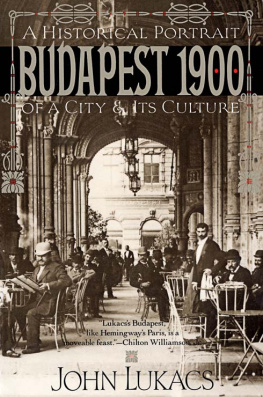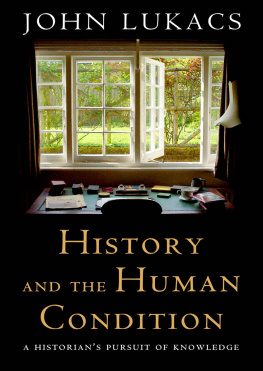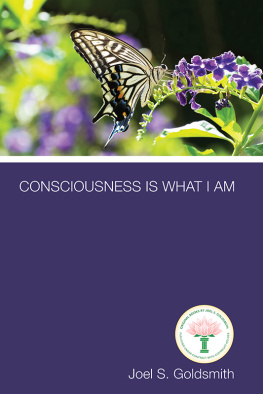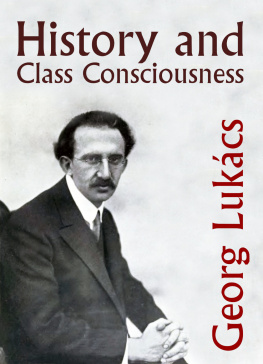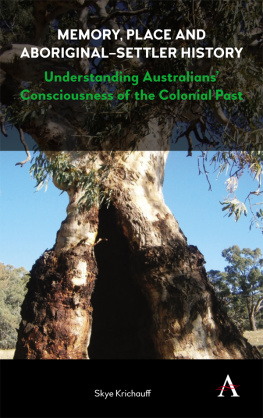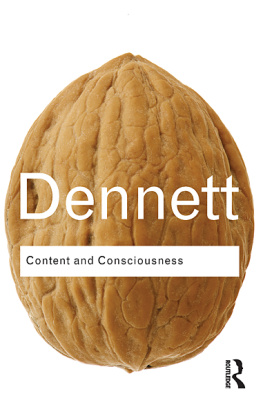HISTORICAL CONSCIOUSNESS
HISTORICAL CONSCIOUSNESS
The Remembered Past
John Lukacs
With a new introduction by the author
and a foreword by Russell Kirk
First published 1994 by Transaction Publishers
Published 2017 by Routledge
2 Park Square, Milton Park, Abingdon, Oxon OX14 4RN
711 Third Avenue, New York, NY 10017, USA
Routledge is an imprint of the Taylor & Francis Group, an informa business
New material this edition copyright 1994 by Taylor & Francis. 1968 and 1985 edition copyright John Lukacs
All rights reserved. No part of this book may be reprinted or reproduced or utilised in any form or by any electronic, mechanical, or other means, now known or hereafter invented, including photocopying and recording, or in any information storage or retrieval system, without permission in writing from the publishers.
Notice:
Product or corporate names may be trademarks or registered trademarks, and are used only for identification and explanation without intent to infringe.
Library of Congress Catalog Number: 93-48925
Library of Congress Cataloging-in-Publication Data
Lukacs, John, 1924-
[Historical consciousness, or, The remembered past]
Historical consciousness: the remembered past / John Lukacs; with a new introduction by the author and a foreword by Russell Kirk.
p. cm.(The Library of conservative thought)
Previously published: Historical consciousness, or, The remebered past. Rev. and enl. ed. New York: Schocken Books, 1985.
Includes bibliographical references and index.
ISBN 1-56000-732-X (pbk.)
1. HistoryPhilosophy. I. Series.
D16.9.L83 1994
901dc20
93-48925
CIP
ISBN 13: 978-1-56000-732-6 (pbk)
MEMORIAE PATRIS
DOCTORIS PAULUS L.
EQUES ORDINIS F. J. I.
VIR ERUDITISSIMUS
EXSORS CONSOLATIONE FIDE CHRISTIANA
VITA SAEPE INFELIX
AMOREM LIBRORUM ARTISQUE
INCULCAVERAT
FILIO IN AETERNAM GRATO
CONTENTS
Library of Conservative Thought
Americas British Culture, Kirk
Authority and the Liberal Tradition, Heineman
A Better Guide Than Reason, Bradford
Burke Street, Scott-Moncrieff
The Case for Conservatism, Wilson
Cline, Hindus
Character and Culture, Babbitt
Collected Letters of John Randolph to John Brockenbrough, Shorey
Congress and the American Tradition, Burnham
Conservatism: Dream and Reality, Nisbet
A Critical Examination of Socialism, Mallock
Edmund Burke: Appraisals & Applications, Ritchie
Edmund Burke: The Enlightenment & Revolution, Stanlis
The Essential Calhoun, Wilson
The Foundations of Political Science, Burgess
Ghosts on the Roof Chambers
The God of the Machine, Paterson
A Historian and His World, Scott
Historical Consciousness, Lukacs
Chose Freedom, Kravchenko
I Chose Justice, Kravchenko
Irving Babbitt, Literature, and the Democratic Culture, Hindus
The Jewish East Side 1881-1924, Hindus
Law Without Force, Niemeyer
Lord George Bentinck, Disraeli
The Moral Foundations of Civil Society, Roepke
Moral Phenomena, Hartmann
Moral Values, Hartmann
Natural Law, dEntreves
On Divorce, de Bonald
Orestes Brownson, Kirk
The Phantom Public, Lippmann
Political Philosophy and Cultural Renewal:
Collected Essays, Wilson
Politics of the Center, Starzinger
Regionalism and Nationalism in the United States, Davidson
Rousseau and Romanticism, Babbitt
The Social Crisis of Our Time, Roepke
Tensions of Order and Freedom, Menczer
The Vision of Richard Weaver, Scotchie
The Voegelinian Revolution, Sandoz
We the People, McDonald
This is the third, and most complete, edition of Historical Consciousness, for which opportunity provided by Transaction Publishers I am very grateful. I have had many inquiries about this bookoddly enough, especially during the last few years, that is, nearly a quarter-century after its original publication in 1968, which has long gone out of printas has its second edition, published in 1985. All of these inquiries question me not about the contents of the book but about its availability. Now Historical Consciousness will be available again, and I must advise its present and future readers about the contents of its successive editions, including the present volume.
The original edition of Historical Consciousness, in 1968, had no introduction, plunging in medias res on page 1 (which, I now know, may have been a mistake). It had, however, a postscript (pages 315-23), summing up the history of the composition of the book itself, in accord with my beliefand, perhaps, with a main argument of the bookthat the history of everything amounts to the thing itself. When, in 1985, Schocken Books published a new, paperbound edition, I found it necessary to make two substantial additions amounting to fifty-four pages. The Introduction, or the state of historical knowledge (1985), pages xxiii-xlii, and another new chapter, VDI: Conclusion, or participant historical knowledge, pages 324-59, are a summation of many of my ideas, and conclusions which crystallized, or matured, during the seventeen years between the two editions. Otherwise the 1985 edition remained identical to the original 1968 one, save for the corrections of a handful of minor typographical or other errata, for four minor addenda (on pages 288, 304, 314) and for what I consider a significant (and perhaps amusing) Addendum on page 315. Howeverfor technical reasonsthe original Idearium and Index of Names remained unchanged, and thus incomplete as well as partially incorrect. In the present Transaction edition these have been corrected.
Historical Consciousness, to me, remains the most important of my seventeen or eighteen books. It would be presumptuous to expatiate on this, except to state that the philosophy, the structure, and the contents of each of my, often very different, books and articles, reflect many of the recognitions and the practices of historical thinking and research and writing that I attempt to set fourth in Historical Consciousness. Between the 1985 and the present edition I wrote, and had published, four different books, among them what I call an auto-history, Confessions of an Original Sinner (1990), in which Chapter 7, Writing, contains some of my recollections about my working on Historical Consciousness. Now, at the age of seventy, I am aware of a few youthful enthusiasms and possible excrescences appearing, here and there, in the pages of the original edition; but I have thought it better to leave the original text as it isnot because of wisdom, but not because of lassitude either.


